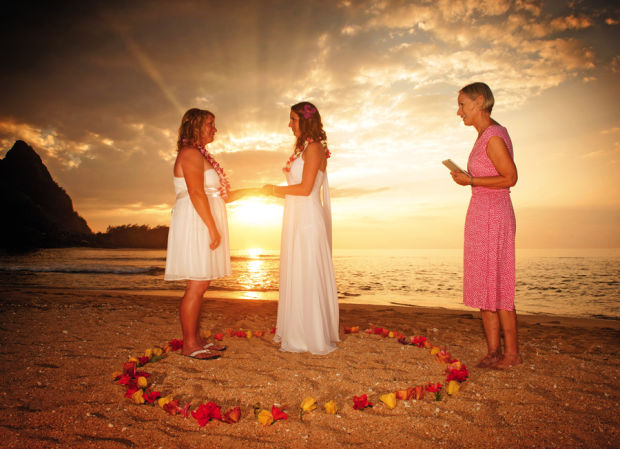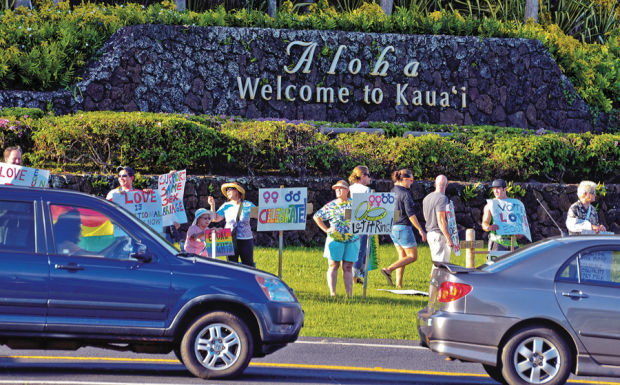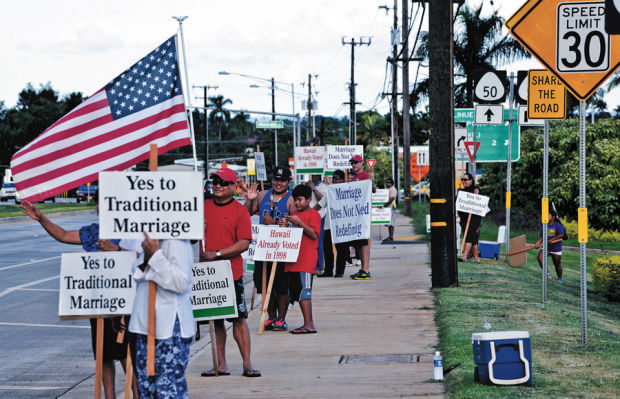LIHUE — As Hawaii’s 76 lawmakers get ready to revise the state’s ban on same-sex marriage, both sides, including Kauai’s residents and lawmakers, are split on the issue.
Some see the proposed bill as move that ensures equality.
Others see it as something that runs counter to religious and traditional marriage principals.
But nearly everyone has an opinion on it.
“I’m gay,” said Jeff Demma, executive director of Malama Pono Health Services, a nonprofit committed to stopping the spread of sexually transmitted diseases, who supports same-sex marriage.
As a person who has a family and the responsibility of raising a child, Demma said he needs the same protections afforded to opposite-sex couples.
Not long ago, Japanese-Americans in Hawaii needed some protections from restrictions in government, he said. This discrimination may be gone, but the law still treats homosexuals as second-class citizens. He said there this is an opportunity for everyone to speak against people’s rights being taken away. There are a number of benefits married couples have — federal tax breaks, insurance discounts, legal benefits and others — that don’t come from domestic partnership, he said.
While the Legislature will convene Monday to determine if homosexuals can wed in Hawaii, Aloha State citizens have voted twice — in 1994 and in 1998 — to prevent gay couples from legally marrying.
Since the U.S. Supreme Court ruled June 26 against the federal 1996 Defense of Marriage Act, five states have legalized same-sex marriage. In September, Gov. Neil Abercrombie announced he would call the state Legislature for a special session to consider a same-sex marriage bill here.
Beginning Monday, 51 representatives and 25 senators will convene at the state Capitol in Honolulu to work on a bill that could potentially level the field for homosexuals and heterosexuals in Hawaii, which in 1994 became the second state ever — among 35 states currently — to pass a ban on same-sex marriage.
So far, Kauai’s delegation at the Legislature is split on the issue.
“Enough of this discrimination thing,” said state Rep. Dee Morikawa, who represents Kauai residents from Koloa to Kekaha, and also Niihau.
Morikawa said she’ll support the bill unless there is something legally bad about it. When civil unions were approved in 2011, she also voted for it.
“Let’s get on with the times, people change, circumstances change,” she said.
Morikawa said she knows pressure will come down on her for supporting the bill, but she’ll do what is right for the future.
“I really do feel equality should be for all,” she said.
The majority of religious congregations on Kauai are for the bill, Morikawa said, but a few large ones are pushing against it, and even among their members there are divided opinions.
Sen. Ron Kouchi, D-Kauai-Niihau, said he missed the final vote in 2011 that approved civil unions in Hawaii, because he was in Washington, D.C. But when the bill was still in committee he voted against it, he said.
In 2012, he supported amendments to clear up the Civil Union Bill, he said.
“But if you ask me on the same-sex marriage bill, at this point I’ll be voting ‘no’ on the bill,” Kouchi added. His decision, he said, is based on the church he belongs to.
Rep. Jimmy Tokioka, who represents voters from Wailua, Lihue and parts of Koloa, also said his vote will be no. But it has nothing to do with his religious views, it’s his constituents who don’t want it, he said.
Earlier this year, Tokioka’s staff surveyed voters in his district, through email and regular mail, and the responses they got were overwhelmingly against same-sex marriage, he said. Additionally, since Abercrombie announced the special session, Tokioka said his office received several calls and emails against the proposal.
He said he sees no urgency in calling the House and the Senate for a special session.
Tokioka said Abercrombie’s reasoning is that he feels a same-sex marriage bill should be passed before the end of the year, so it can benefit Hawaii residents next fiscal year.
“Does it rise to the occasion of just coming in for that one session, that one item? I don’t think so,” Tokioka said.
Following the U.S. Supreme Court ruling that DOMA is unconstitutional, the IRS and U.S. Treasury Department ruled same-sex couples legally married in jurisdictions recognizing their marriages will be treated as married for federal tax purposes.
Last week, New Jersey became the 14th state in the United States to pass a same-sex marriage law, joining five other states in 2013.
Additionally, the U.S. Department of Veteran’s Affairs announced gay married couples will be eligible for benefits, and the Pentagon announced married same-sex couples will be eligible for the same health care, housing and separation benefits as married opposite-sex couples.
“Of the 13 states that have same-sex marriage … those couples can qualify for federal tax exemptions,” Tokioka said.
Since Abercrombie’s announcement, some religious groups have spoken against same-sex marriage.
“God sees homosexuality as an abomination, like a stench to his nostril,” said retired pastor Roy Sasaki, who helped organize some of the many recent roadside protests in Kauai against same-sex marriage.
Sasaki said Christians love gays and lesbians, but don’t condone their “activities,” which are sins, as are fornication and adultery by heterosexuals.
“Sin is sin,” he said.
Sasaki said he wants those who “claim to be gay and lesbian” to come to know Jesus. He added he knows people “who have been gay” and became heterosexuals after accepting God.
Besides, he said, the people of Hawaii already voted against same-sex marriage 15 years ago. And even so, God is the “real governor” of Hawaii, he said.
Each year the Legislature convenes for 60 legislative days, starting on the third Wednesday of January. Special Legislature sessions can be called during the remainder of the year, either by the governor or by written request of two thirds of members of the House and the Senate.
Rep. Derek Kawakami, representing Haena to Kapaa, said his support for marriage equality — and equality for all — is based on the foundation of how he was raised.
“I was brought up in a household that was very inclusive of many different belief systems and lifestyles,” he said in a statement. “I was raised to accept and embrace people for who they are, whether it be religious beliefs, ethnicity, how they talk, what they look like, or in this case, different lifestyles.”
Being a Catholic has put him in a unique situation, Kawakami said, but religion has always been a rather private issue for him.
“I have always felt that how we worship as a family was best reserved within the church and confines of our house, and that the way we can perpetuate our religious beliefs could best be demonstrated in how we treat each other, especially to those who we disagree with,” he said.
Kawakami, however, had one concern with the bill, which he said he feels can be strengthened. Churches should have their religious freedoms preserved, and should not be forced to marry couples who do not fall within their religious beliefs, he said.
“This I can agree with and feel that it is a reasonable request,” said Kawakami, adding there are other churches that may be open to performing same-sex marriages, and they should be able to exercise this if they choose to.
He said many members of the community have voiced concerns. Lawmakers are often called upon to make decisions that will hurt some, and to those he apologizes, he said.
“This will be unpopular for some but in my heart, I feel that this is the right thing to do,” Kawakami said.
• Léo Azambuja, staff writer, can be reached at 245-0452 or lazambuja@thegardenisland.com






